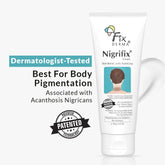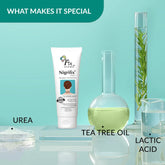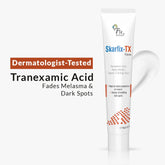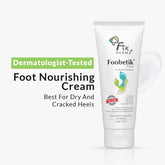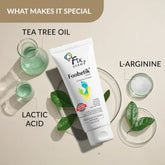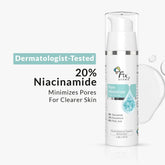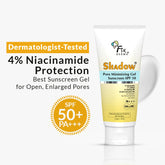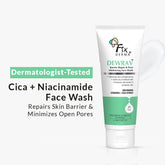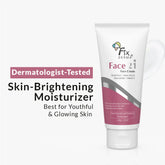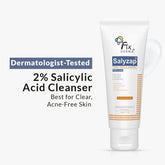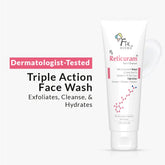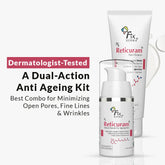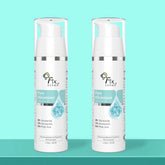Open Pores

Reasons Behind This
Excess Sebum Production
Overactive sebaceous glands produce too much oil, which can stretch out the pores, making them appear larger. This is often linked to oily skin.
Hormonal Fluctuations
Hormonal changes during puberty, pregnancy, or menstruation can cause an increase in sebum production, which can stretch pores.
Sun Damage
Excessive sun exposure can thicken the skin's outer layer, leading to less elasticity and enlargement of pores.
Improper Skincare
Not removing makeup, dead skin cells, or excess oil regularly can lead to clogged pores, which may enlarge over time. Using harsh or non-comedogenic products can also aggravate the issue.

How To Prevent Open Pores?
Cleansing Regularly
Wash your face twice daily with a gentle cleanser to remove excess oil, dirt, and dead skin cells that can clog pores.
Exfoliation
Use exfoliating ingredients like Salicylic Acid or Glycolic Acid to remove dead skin cells and prevent pores from becoming clogged. Avoid over-exfoliating, as this can irritate the skin and enlarge pores.
Use Sunscreen
Sun damage can break down collagen and elastin, causing pores to appear larger. Apply a broad-spectrum sunscreen daily to protect your skin from UV damage.
Moisturize
Hydrating the skin with non-comedogenic moisturizers helps to balance oil production and keeps pores from becoming enlarged due to dehydration.

Risk Factors
Aging and Loss of Elasticity
As the skin ages, it loses collagen and elastin, which are responsible for keeping skin firm. The lack of these structural proteins can cause pores to widen.
Acne
When acne forms, pores become clogged with oil, dead skin cells, and bacteria. This can expand the pore walls, making them appear larger even after the acne subsides.
Rough Skin Texture
Enlarged pores can make the skin surface appear uneven and rough, affecting the smoothness of the complexion.
Excess Oil Production
Open pores are often associated with oily skin, and excess oil can give the skin a greasy appearance, making makeup application and long-lasting wear more difficult.

Tips From An Expert's Desk!
Avoid Heavy Products
Opt for lightweight, oil-free skincare products that won't clog pores. Avoid heavy creams and thick makeup, as they can block pores.
Use Retinoids
Retinoids can increase skin cell turnover, preventing dead skin cells from accumulating and clogging pores. This can also help shrink the appearance of pores over time.
Maintain a Healthy Diet
Eating foods rich in antioxidants, vitamins, and minerals can support skin health and prevent excessive oil production.
Maintain Overall Skin Health
Maintaining a balanced skincare routine that includes antioxidants and peptides helps boost skin elasticity and prevents the enlargement of pores over time.
What causes large open pores?
Open pores on the face refer to the visible and enlarged pores on the skin's surface. They are more common on the nose, forehead, and cheeks and can be caused by various factors, including genetics, age, excessive sebum production, and exposure to pollutants and UV rays.
Open pores can be caused by various factors, including:
-
Genetics: Pore size is largely determined by genetics. If your parents have large pores, you are more likely to have them as well.
-
Age: As we age, our skin loses elasticity, which can cause pores to appear more prominent.
-
Excessive sebum production: Overproduction of oil or sebum can cause pores to become clogged, leading to inflammation and enlargement.
-
Exposure to pollutants: Exposure to pollutants and environmental toxins can cause oxidative stress and inflammation, which can contribute to the appearance of open pores.
-
Sun damage: Exposure to UV rays can damage the collagen and elastin in the skin, causing it to lose elasticity and making pores more visible.
-
Poor skincare habits: Neglecting to cleanse and exfoliate the skin properly can lead to a build-up of oil, dirt, and dead skin cells, which can clog pores and make them appear larger.
It's important to note that while some of these factors are within our control, such as skincare habits and sun protection, others, like genetics and age, cannot be changed. However, proper skincare can help minimize the appearance of open pores and keep the skin looking healthy and radiant.
What happens to pores as we age?
As we age, our pores undergo changes that can cause them to appear larger and more visible.
Here are some of the key changes that occur:
-
Decrease in skin elasticity: As we age, the skin loses its elasticity and becomes less firm. This can cause the skin around the pores to sag, making them appear larger and more noticeable.
-
Increase in sebum production: Although sebum production tends to decrease with age, some people may experience an increase in sebum production due to hormonal changes. This can cause the pores to become clogged and more visible.
-
Loss of collagen and elastin: Collagen and elastin are proteins that give the skin its structure and elasticity. As we age, the production of these proteins decreases, causing the skin to become thinner and less resilient. This can make pores more visible and accentuate their appearance.
-
Exposure to environmental stressors: Over time, exposure to environmental stressors like pollution and UV radiation can damage the skin, causing inflammation and oxidative stress. This can lead to a breakdown of collagen and elastin, making pores more visible.
Overall, while pore size is largely determined by genetics, the aging process can exacerbate their appearance. However, proper skincare and lifestyle habits, such as protecting the skin from sun damage and using products that promote collagen production, can help minimize the appearance of pores and keep the skin looking healthy and youthful.
How to diagnose large open pores?
Large open pores are typically easy to diagnose by visual inspection. They appear as visible, enlarged openings on the skin's surface, usually on the nose, forehead, and cheeks. However, a dermatologist or skincare professional may use specialized tools to examine the pores more closely and determine the severity of the condition.
A tool known as a skin analyzer, uses digital imaging technology to analyze the skin's texture and pore size. During a skin analysis, a skincare professional may also assess the skin's oiliness, hydration levels, and any signs of inflammation or irritation. This information can help guide the development of a personalized skincare regimen for the permanent treatment for open pores.
Which products would a skin therapist recommend for open pores?
The best Fixderma Open pores treatment products are:
-
Reticuram Face Cleanser: Reticuram face cleanser is a retinol-infused face cleanser that effectively detoxifies your pores and sloughs off dead skin cells that make your skin look dull and prematurely aged. It gives your skin a clear, pure and healthy state.
-
Reticuram Serum: Reticuram serum is a lightweight retinol serum that penetrates deep into your skin to reduce signs of ageing, promote cell turnover, improve skin texture, reduce acne marks and boost skin firmness.
-
Salyzap Face Cleanser: Salyzap face clear is a salicylic acid face wash that exfoliates your skin, unclogs pores, keeps excess sebum in check and prevents acne formation. It also reduces blackheads and whiteheads.
-
Face 21 Cream: Face 21 cream rejuvenates your skin by enhancing its luminosity and reducing wrinkles and fine lines. It hydrates your skin and moisturizes your skin without feeling greasy or heavy on the skin.
FAQs
1. What causes open pores on the face?
Open pores are typically caused by excess oil production, aging, and genetics. Environmental factors, such as pollution and sun damage, can also contribute to enlarged pores.
2. How can I minimize open pores on my face?
Using skincare products like pore minimizers, salicylic acid, or niacinamide can help tighten skin and reduce the appearance
of open pores. Regular exfoliation also aids in keeping pores clear.
3. What is the best treatment for open pores?
The best treatment for open pores includes using a pore minimizer serum that controls oil production, exfoliates, and tightens skin. Look for ingredients like salicylic acid, retinol, and niacinamide for optimal results.
4. Does Fixderma have products for large pores?
Yes, Fixderma offers a range of products specifically designed to tighten skin and minimize large pores. Check out our Pore Minimizer Face Serum and other pore-refining solutions.
5. How can I tighten pores naturally?
Natural remedies like aloe vera, ice cubes, and green tea can help tighten pores temporarily. However, consistent use of effective skincare products like Fixderma’s pore-minimizer serums offers long-term solutions.
6. What are the key ingredients that help minimize open pores?
Key ingredients to look for in products for open pores include salicylic acid, niacinamide, retinol, and glycolic acid. These ingredients help exfoliate, tighten, and reduce excess oil production.
7. Is Fixderma Pore Minimizer Serum effective?
Yes! Fixderma Pore Minimizer Face Serum is formulated to reduce pore size by controlling oil production and providing a smooth, even texture.
8. Can open pores be cured permanently?
While open pores cannot be fully cured, their appearance can be minimized with consistent skincare routines. Using pore-refining products like Fixderma’s Pore Minimizer Serum can significantly reduce their visibility over time.
9. Can I use Fixderma products if I have sensitive skin?
Yes, Fixderma products are formulated to be gentle yet effective. Our pore-minimizing products are suitable for sensitive skin, but it’s always a good idea to patch-test before regular use.
10. How often should I use pore-minimizing products?
For best results, use pore-minimizing products like Fixderma Pore Minimizer Serum twice a day—morning and evening—after cleansing your face.
11. Can Fixderma’s products help with clogged pores?
Yes, Fixderma products like the Pore Minimizer Serum and face cleansers are specifically designed to unclog pores, reduce blackheads, and minimize pore size.
12. Are Fixderma’s pore minimizers suitable for oily skin?
Absolutely! Fixderma’s pore minimizers are perfect for oily skin as they help control excess sebum production while tightening and refining pores.
13. How long does it take to see results from pore minimizers?
Results vary depending on skin type and consistency, but you can typically start seeing visible improvements in pore size within 2-4 weeks of regular use.
14. Can I use pore-minimizing products with other skincare treatments?
Yes, Fixderma’s pore minimizers can be incorporated into your skincare routine alongside other treatments like exfoliants or anti-aging products. Just be sure to follow the order of application: cleanse, tone, treat, moisturize.
15. Are Fixderma’s pore-minimizing products safe for daily use?
Yes, Fixderma’s pore-minimizing products are safe for daily use. They are designed to be gentle on the skin while offering effective results.
16. What is the best way to reduce pore size on my nose?
The nose often has more visible pores due to oil production. Use Fixderma’s Pore Minimizer Serum and follow with regular exfoliation to reduce pore size and improve skin texture.
17. Can Fixderma help with blackheads around open pores?
Yes, Fixderma’s products are formulated to treat both open pores and blackheads. Regular use of pore-refining serums and gentle exfoliants can help clear blocked pores and reduce blackheads.
18. Where can I buy Fixderma’s Pore Minimizer products?
